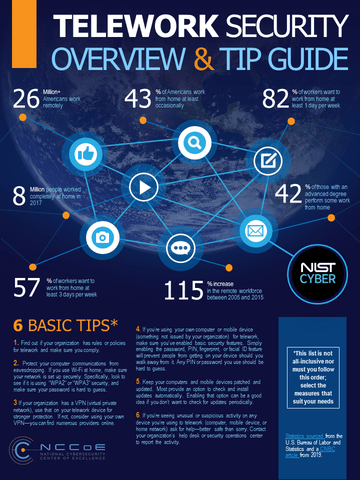Telework Security
Improve Telework Security Basics
Improve Your Telework Security
With many changes happening at once, telework security could be an afterthought or completely overlooked. This could put you and your organization at increased risk from attackers, who are always looking for opportunities to take advantage of disruption generally and weak security practices specifically. But it’s more than your organization at risk—if your telework devices are compromised, anything else connected to your home network could be at risk too.
Don’t panic. There are some simple things you can do to improve your cybersecurity posture. The tips that follow apply to almost all situations, and they’re relevant whether you’re using your organizations’ laptop or smartphone, or your own personal desktop or tablet.
Basic tips to improve your Teleworking Security
- Find out if your organization has rules or policies for telework, and if so, make sure you read them and comply with them. For example, it may be OK for you to use your own computer for reading company email but not for accessing sensitive customer data.
- Protect your computer communications from eavesdropping. If you use Wi-Fi (wireless networking) at home, make sure your network is set up securely. Specifically, look to see if it is using “WPA2” or “WPA3” security, and make sure your password is hard to guess. If you’re unsure how to do this, you might be able to find a how-to video or checklist online by doing a search for your Wi-Fi router brand and model.
- If your organization has a VPN (virtual private network), use that on your telework device for stronger protection (your organization’s telework rules or policies will likely tell you if you do). If not, consider using your own VPN—you can find numerous providers online.
- If you’re using your own computer or mobile device (something not issued by your organization) for telework, make sure you’ve enabled basic security features. Simply enabling the PIN, fingerprint, or facial ID feature will prevent people from getting on your device should you walk away from it. Any PIN or password you use should be hard to guess.
- Keep your computers and mobile devices patched and updated. Most provide an option to check and install updates automatically. Enabling that option can be a good idea if you don’t want to check for updates periodically.
- If you’re seeing unusual or suspicious activity on any device you’re using to telework (computer, mobile device, or home network) ask for help—better safe than sorry. Contact your organization’s help desk or security operations center to report the activity.

